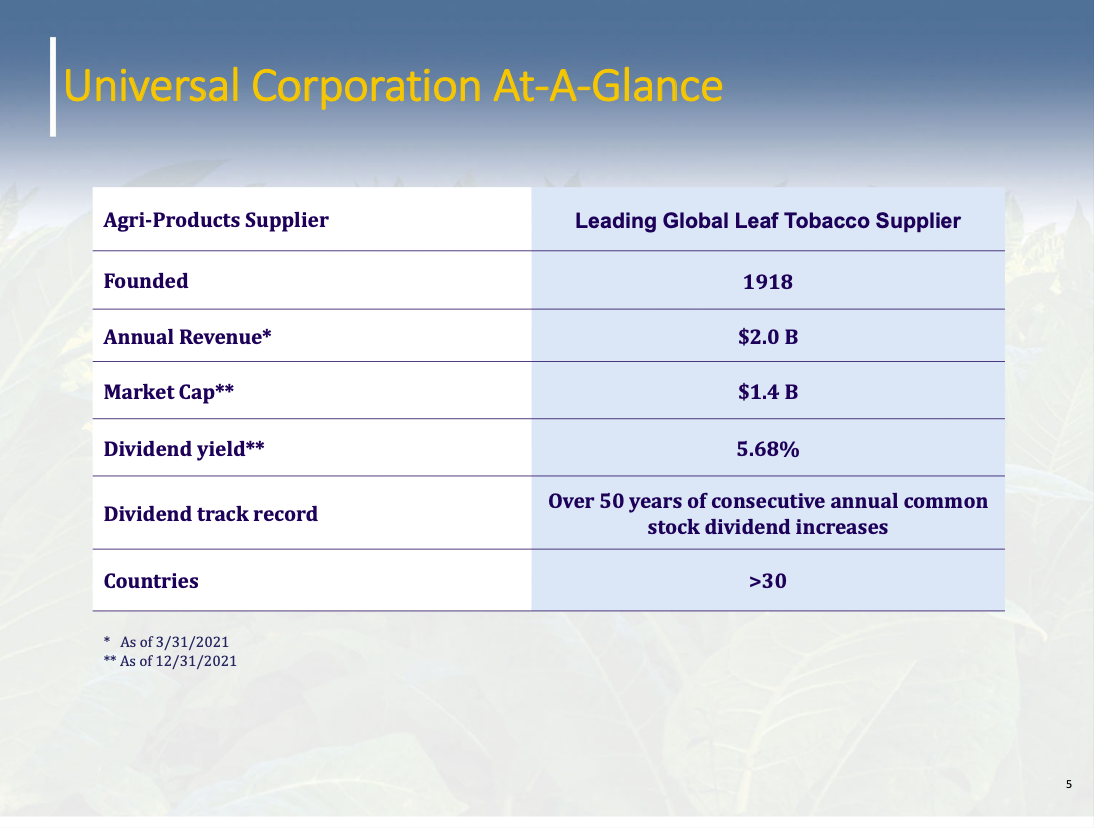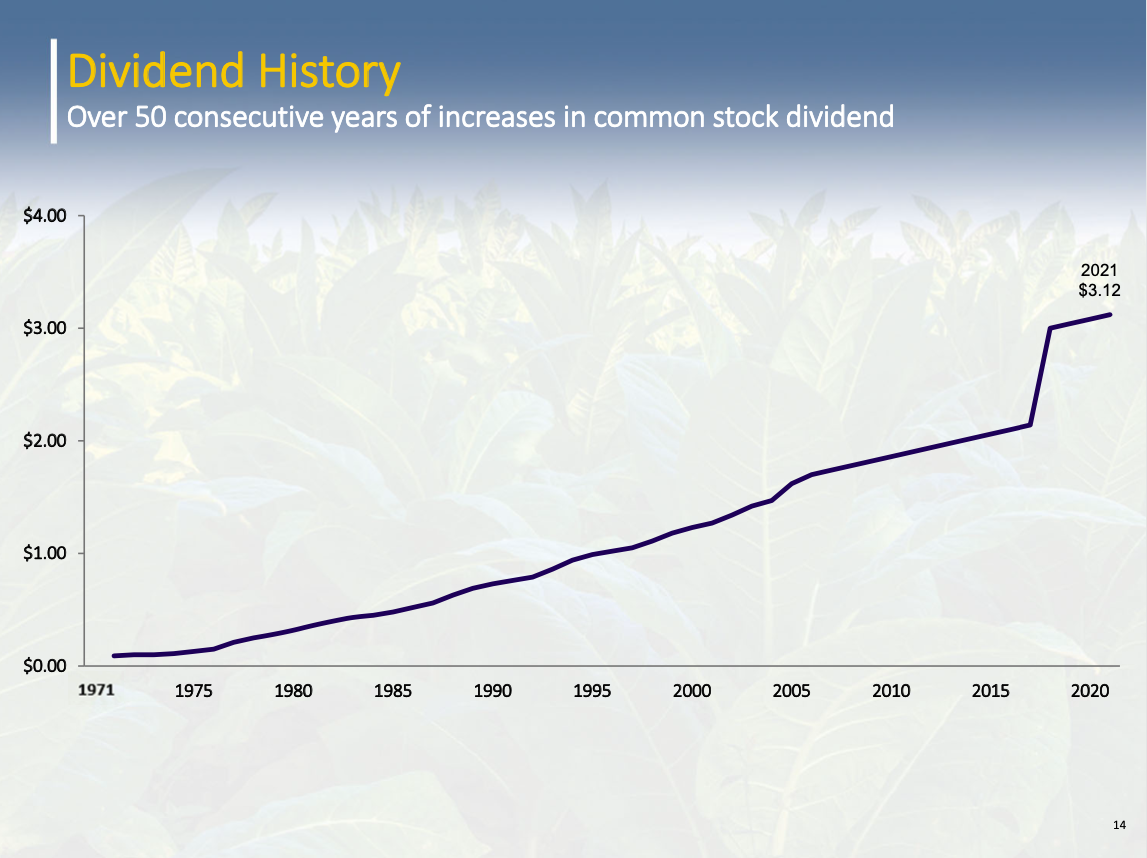High Dividend 50: Universal Corporation
Universal Corporation (UVV) is a Dividend King with a very high dividend yield. But the decline of the U.S. cigarette industry poses long-term difficulty. Overall, Universal is a high-risk dividend stock.
Business Overview
Universal Corporation is a market leader in supplying leaf tobacco and other plant-based inputs to consumer product manufacturers. The company was founded in 1918 and today operates in two segments: Tobacco Operations and Ingredient Operations.
The Tobacco Operations segment buys and sells tobacco used to make cigarettes, cigars, pipe tobacco, and smokeless products. Universal deals in flue-cured, burley, and oriental tobaccos. The company buys tobacco from its suppliers, processes it, and sells it to large tobacco companies in the US and internationally.
The Ingredient Operations deals mainly with vegetables and fruits but is significantly smaller than the tobacco operations. Like tobacco, the company buys fruits and vegetables, processes them, and sells inputs to food, beverage, and flavor companies. The company has been growing this business through acquisitions starting in 2020.
Total revenue was $1,983.4 million in fiscal 2020 (ends on March 31st) and $2,074.2 million in the past 12 months.

Source: Investor Relations
Growth Prospects
Universal’s primary business has been declining for years as a supplier to a waning industry. Cigarette sales declined from a peak of 635.6 billion in 1981 to 203.7 billion in 2020. The combination of regulation and health concerns about cancer means it is unlikely the long-term decline will reverse. Furthermore, e-cigarettes and smokeless products provide more competition and are increasing sales. In turn, they have accelerated the long-term decline of cigarette sales.
Universal’s revenue has decreased at a (-2.56%) CAGR in the past decade as a supplier to the cigarette manufacturers. Earnings per share have been volatile but are falling with a (-5.03%) CAGR in the past decade. Diluted earnings peaked at $5.25 per share in fiscal 2014.
A strategic review in 2019 caused the company to move into non-tobacco industries. The company is growing through acquisitions of fruit and vegetable suppliers. Universal acquired FruitSmart and Silva in 2020 and Shank’s Extracts in 2021.
The fruit and vegetable supply businesses are like the leaf tobacco business. However, this business has better long-term prospects than the leaf tobacco business, and thus it is likely Universal will continue growing through acquisition.
Competitive Advantages
As one of the leading players in a declining industry, Universal has little to worry about with new entrants. The company’s main competitors are Pyxus International and the cigarette manufacturers who can directly source leaf tobacco.
However, Universal has a long history of established relationships with farmers and cigarette manufacturers, which are difficult to replicate and result in entry barriers.
Furthermore, Universal adds value by checking the quality, blending, and testing the leaf tobacco before selling it to customers. This value-added function adds to the company’s competitive advantage.
Next, since the industry is declining, significant capital expenditures are not needed. For example, in fiscal 2021, the company had an operating cash flow of $220.4 million but required only $66.2 million in capital expenditures. The free cash flow (FCF) can be used for acquisitions to expand the Ingredient Operations segment and return cash to shareholders.
Dividend Analysis
Universal is a long-term dividend growth stock. The company has paid an increasing dividend for 51 years since 1971. This fact makes the stock one of only 36 Dividend Kings. The forward dividend rate is $3.12 per share, giving an excellent forward dividend yield of ~5.7%. This value is greater than the 5-year average of 5.32%. It is also more than four times the average dividend yield of the S&P 500 Index.
The company is seemingly dedicated to the dividend and lists it as the No. 2 priority for capital allocation. The company’s dividend growth rate is ~4.91% in the past decade and approximately 7.9% in the trailing 5-years. However, the most recent increase was only 1.3% due to the high payout ratio.

Source: Investor Relations
The payout ratio is high at approximately 87%. The payout ratio was roughly 50% of net profits for the past decade. After completing a strategic review, Universal raised the dividend by 36% in 2019. The higher dividend requires more cash to pay dividend, and it required $76.1 million in the past 12 months. This value exceeds free cash flow (FCF) of ~$58.0 million during this period indicating the company needed to issue debt to fund the dividend.
Universal’s debt is rising due to the acquisitions. Total debt is now about $819.6 million, and net debt is around $720.3 million. Rising debt has reduced interest coverage to about 6.8X and simultaneously increased the leverage ratio to 2.8X. The current credit rating is BBB- a lower medium investment-grade credit rating by Fitch. Investors should note that this is only one notch above investment grade.
Final Thoughts
High dividend stocks have instant appeal for income investors. But investors should carefully analyze each company before buying individual stocks, as there may be warning signs of potential challenges.
Universal Corporation is one of the highest-yielding Dividend Kings.
Despite the high dividend yield, Universal is not a stock most income investors should consider. The stock price has risen about 92.3%, while the S&P 500 Index has surged nearly 300% in the past decade. The main problem is the company’s industry is in secular decline.
Universal is trying to grow in the fruit and vegetable market space through the acquisition of smaller companies, but debt is rising. The dividend safety metrics suggest a dividend cut may occur in the future. Investors seeking dividend income may want to stay clear of Universal.
Disclaimer: Sure Dividend is published as an information service. It includes opinions as to buying, selling and holding various stocks and other securities. However, the publishers of Sure ...
more


